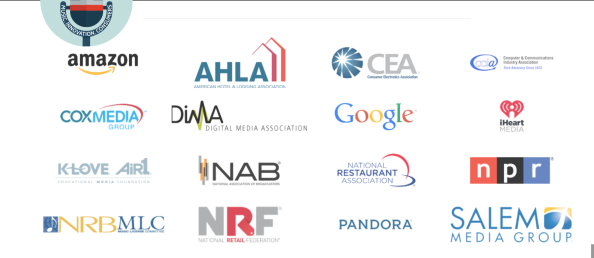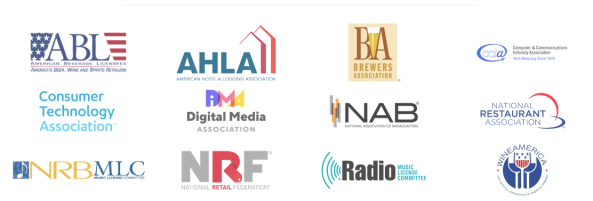Fair Pay, Fair Fight: For Musician Radio Royalties, Will The Circle Be Unbroken?
After the struggle of getting the Music Modernization Act passed and allegedly gave pre-1972 artists the royalties they finally deserved, a new merger between Sirius and Pandora by their hold-tightening parent company Liberty Media, has artists and advocates gearing up for an ongoing fight against tech companies and their lobbyists.
________________________
Guest post by Chris Castle of Music Technology Policy
The Music Modernization Act brought fairness to pre-72 artists who waited 20 years for the government to confirm what everyone knew—that non interactive digital music services like Pandora and Sirius should be paying them performance royalties like everyone else. Not that they didn’t try–Liberty Media’s lobbyists tried to administer an 11th hour beat down of old guys and dead cats in the Senate in the waning hours of the Music Modernization Act in an unholy alliance with Big Tech in that very special DC room of mirrors led by Oregon Senator Ron Wyden.
So what makes anyone think that we’ll get fairness without a fight after the merger of Sirius and Pandora announced this week, since parent corporation Liberty Media has now managed to consolidate its hold on 34% of LiveNation “…creates what the companies call the world’s largest audio entertainment company…Policy experts also say the merger empowers a company that’s aggressively fought to suppress royalty payments for artists and copyright holders.”
Now that the CLASSICS Act, as inserted in the omnibus MMA, confirmed that those pre-72 artists are entitled to their non interactive royalties, we can recognize that treating pre-72 artists fairly was just another fake concession dreamed up by digital services starting with Sirius and Pandora (and their lobbying group, the Digital Media Association) for something that should have never happened in the first place. Now we can all turn back to the real test of fundamental fairness—terrestrial performance royalties.
Why wasn’t this fundamental right included in the MMA? In the run-up to the initial version of the MMA (before CLASSICS and AMP were added to create the omnibus bill that passed), we were all told by the bill’s sales team to forget ever getting a terrestrial royalty. It was something that was simply never going to happen because the lobbying power of the MIC Coalition was simply too strong.
Bunk.
If you’ve never heard of the MIC Coalition, it is a lobbying group that was assembled in 2015 for the purpose of stopping the Fair Play Fair Pay legislation introduced in the House of Representatives by now House Judiciary Chairman Jerry Nadler. Google, of course, is a founding member of the MIC Coalition alongside Amazon, NPR, iHeart Media, Pandora, Salem Media Group, Cox Media Group, the NRB Music Licensing Committee, the American Hotel & Lodging Association, the National Association of Broadcasters, the National Restaurant Association, the National Retail Federation, the Educational Media Foundation, the Computer and Communications Industry Association, the Consumer Electronics Association (now Consumer Technology Association) and of course the Digital Media Association.

Shortly after the MIC Coalition was founded, Amazon and NPR resigned from the organization and the Radio Music License Committee, the Brewers Association, and Wine America joined. Then individual companies removed their logos and the public facing membership became only the trade associations.

It must be said, of course, that the MIC Coalition is a Goliath-like array of lobbying muscle. But that’s kind of the point. Even so, you’d be a fool not to take it very seriously. Now for some of the Washington folk, this may seem like time to run up the white flag before Longshanks. But I’m happy to say that the neither the I Respect Music campaign nor the MusicFirst Coalition have flinched, and I’m just Texan enough to call that a fair fight. I fully expect that now-Chairman Nadler will want to revisit his Fair Play Fair Pay legislation in the coming days of the new Congress. We’re behind him 110%. I for one am ready for the fight and craving the fray.
This new battle was joined with A2IM CEO Richard James Burgess in an op-ed last November that summed up the status quo:
The musicFIRST coalition (A2IM, AFM, Recording Academy, Sag-AFTRA,
SoundExchange, RIAA), has been in negotiations with the NAB (National Association of Broadcasters) under House Judiciary Committee Chairman Goodlatte’s guidance. The objective was a consensus agreement, which the Chairman would enshrine in legislation. Legislation is essential to ensure that artists, musicians, singers, producers, and labels are not only paid for U.S. airplay but also from spins in the rest of the world. It is estimated that these U.S. creators and the U.S. economy are losing hundreds of millions of foreign-trade dollars each year because the NAB has so effectively blocked this legislation. If such a law should pass, the U.S. would no longer be aligned with countries like North Korea, China, and Iran in suffering a radio industry that doesn’t compensate creators.Sadly, NAB CEO, Gordon Smith, telegraphed radio’s true intentions on April 9 when he cited “Five Big Wins,” with number three being, “We again fought back attempts by the record labels to tax radio stations simply for promoting and playing the music listeners love to hear.” In the same speech he boasted, “And, most recently, broadcasters were instrumental in securing $1 billion in legislation passed by Congress to reimburse radio and television stations for their costs during the spectrum repacking process, ensuring viewers and listeners don’t lose access to their stations.”
I find it fascinating that Smith has the gall to refer to a small royalty for the use of our music as a tax (a tax is paid to the government, not to property owners, for the use of their property). Then, in the next breath, he bragged about extracting a billion dollars from our government for the radio industry.
Music on the radio has enriched listeners’ lives and built empires for some radio station owners. We call on Congress to ensure that U.S. music artists and their funders are finally paid their fair share. Let us not enter a second “Century of Shame.”
And SoundExchange CEO Mike Huppe’s Billboard op-ed last December was another call to arms for fair treatment:
Efforts by the music industry to find a common ground of “fairness” with the broadcasters have thus far failed. That is why we need to heed Frank Sinatra’s call to organize and demand that Congress pass legislation to give creators royalties when their music is played on terrestrial radio.
Like the MMA, the terrestrial radio royalty will be a heavy lift in Washington, no joke–particularly after the consolidation of Sirius and Pandora. And like the MMA, I suspect it will take everyone’s efforts to make it happen. Unlike the MMA, it’s not an omnibus bill that cuts across our industry with something for almost everyone. The only reason the MMA didn’t contain the terrestrial royalty is because the consensus view—not mine, but I went along with it—was that terrestrial was a bridge too far. Now that everyone else got theirs with MMA, the question is who will remember that deal and who will forget their obligations.
We, of course, will be where we always are. That’s not the question, though. The question is what is the rest of the MMA coalition prepared to do? I, for one, certainly know what my expectation of them is going to be, no flinching and no excuses. We will be watching to see if the circle remains unbroken the next time we are called to stand up and be counted.
And if they don’t we’ll go it alone.
(A version of this post first appeared in MusicTechPolicy Monthly newsletter.)
why would sirius/pandora fight a terrestrial performance right? they already pay performance rights on every stream, since it is digital, so if anything they would support it to make the playing field with terrestrial even…
When technology changes at a more rapid speed than laws do things like this are always going to be difficult. Before reading this article I had no idea music streaming platforms such as Pandora had not given the artists whose music they were playing any sort of royalties. These type of acts are something which us as music lovers must get behind and see justice come through! I talk about the modernization of music and music streaming sites in my new blog post. Go check it out
http://nicolaskilpatrick.weebly.com/blog